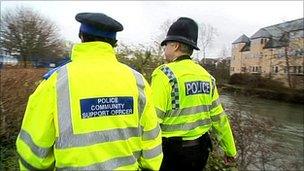Police Commissioner elections yet to register with many
- Published

Nick Ross says politicians should not apply for the new posts
A year before elections for police commissioners in England and Wales, three-quarters of people know nothing about them, a poll suggests.
The elections will create Police and Crime Commissioners in 41 force areas outside London.
Commissioners in the biggest force areas will receive salaries of more than £100,000.
Their job includes setting priorities for their police force, overseeing its budget and hiring the chief constable.
An online survey of 1,878 people carried out by Comres for the Local Government Association, suggested that despite low awareness of the forthcoming elections, two-thirds of those questioned said they would vote.
Half said that a candidate with a knowledge of local issues which affect crime and with a willingness to support the community would be likely to win their support.
The former BBC Crimewatch presenter Nick Ross, who is keen to be a commissioner, said he doubted politicians would be suitable for the commissioner roles.
He says this is because they would come under pressure to address crime simply by arresting more criminals.
Gary O'Donoghue hears from policing insiders who are sceptical about government plans for voters to decide on police commissioners
"It's deeply entrenched that how to solve crime should be as easy to us as how to be good in bed, but actually, it's an empirical issue," said Mr Ross, who is a visiting professor at the Jill Dando Crime Science institute at University College London.
"This is going to be driving them more and more to arrests."
Another critic of the process is the popular police blogger, who uses the name Inspector Gadget.
Inspector Gadget, who has written a book about his experiences of everyday life on the beat, said there was a "huge danger" that elected police commissioners with a political stance would cause a return to the days of police targets.
"One would assume that whoever gets elected wants to be elected again, and the way to get elected is to show that you're dealing with crime better than the next guy, and the way to do that is to give the police targets and make them stick to them.
"I thought the government had abolished the idea of targets."
The government denies commissioners will lead to more targets being set - insisting that police authorities, which are to be abolished, have neither held police properly to account nor ensured the public's priorities are listened to.
The Lord Mayor of Hull, Colin Inglis, is considering standing for Labour in the police commissioner elections because of his previous experience as the chairman of Humberside police authority.
He said: "No party seems to yet have a clue how it's even going to select its candidates. Certainly, talking to electoral officers in my own authority, they haven't begun to think about how these elections will be organised yet."
Among the main political parties, Labour and the Conservatives are yet to establish a process for choosing candidates.
The Liberal Democrats will have no candidates, but their MPs and councillors will be free to support independents. Plaid Cymru will decide at a national council meeting this weekend whether to contest the elections.
Peter Jones, the Conservative leader of East Sussex County Council, has begun campaigning for the Police and Crime Commissioner position in Sussex. He said many police authorities were unaccountable.
"A problem facing quite a few places around the country is that single parties dominate," he said. "The ballot box is a great weapon for the public to use against people who get it wrong."
The new commissioners will hold the largest personal electoral mandates in the UK outside London. But Inspector Gadget says they will be elected without a genuine popular mandate.
He said: "I worry about small majorities on low turnout. The direction of a force is decided effectively by a small number of people who are passionate enough about one issue to come out and turn up."
- Published28 September 2011
- Published3 November 2011
- Published21 October 2011
- Published2 October 2011